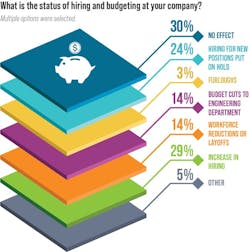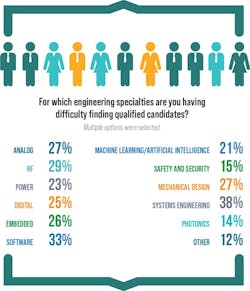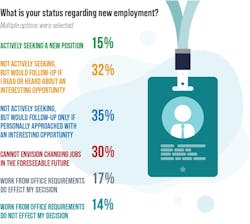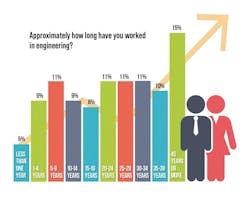Employment Prospects for Engineers are Looking Up
This article is part of the Professional Advancement series: Annual Salary Survey.
As technology and manufacturing companies seek out scarce talent to stay ahead of the innovation curve, engineers are seeing their stock rise. In such a tight labor market, they’re getting more optimistic about their salary potential.
Nearly 70% of the survey’s respondents said that not enough engineers have the necessary skills, according to Electronic Design’s annual salary survey, which was conducted in recent months along with the other titles in Endeavor Business Media's Design and Engineering Group.
What skills are considered “necessary” can be subjective and constantly changing. But as it turns out, 64% expressed their companies are having trouble finding qualified candidates—whether in electrical, mechanical, wireless, power, or other disciplines—to fill open positions.
While they continue to struggle with long hours, tight deadlines, and the pressure to take their work home, most engineers have a favorable outlook on the future of the profession and their place in it. Despite the challenges of staying up to date on the latest innovations, they feel confident for the most part about their prospects for pay in the year ahead.
More than 65% of this year’s survey respondents earned raises in 2023, and many anticipate further wage growth in 2024. But as inflation—particularly in the U.S.—keeps rising, these paychecks simply don’t stretch as far as they did before.
The engineering profession is reaching a point where a large portion of the workforce is retiring, which not only creates opportunities for engineers entering the field, but for those who are in the thick of their careers. It’s also raising red flags about the lack of engineering and technical talent entering the industry. A recent report from Oxford Economics revealed that around 1.4 million jobs requiring such skills will remain open by 2030 in the US alone.
While many engineers admit that they need to move into management or executive roles to start seeing significant gains in compensation, the shortage of engineering talent is paying dividends for those with skills in high demand. Some engineers believe their companies are starting to realize they need to pay better to lock down top talent. About two-thirds say employers are already compensating them sufficiently.
Engineering pros are a motley—and geographically diverse—group. This year’s survey polled a sample of 2,660 engineers comprised of Electronic Design, Machine Design, Microwaves & RF, and Power & Motion readers. They include engineers from around the world at varying stages of their careers in disparate areas of technical competence, including full- and part-time workers with a wide range of job duties and titles.
While we’re still reviewing salary figures from the survey, here’s what engineers are saying about their employment outlook.
Skilled Engineers See Their Stock Continue to Rise
The consensus from the rank-and-file engineers, managers, and executives on the front lines of the profession is that opportunities abound. Many companies are moving ahead with their hiring plans, undaunted by economic uncertainty.
About 30% say that the status of hiring and budgeting for the engineering department at their company is up in 2023, giving them a degree of stability at a time when—at least in the U.S.—high interest rates threaten to pitch the economy into recession. Less than 25% of the engineers who participated in this year’s survey say their companies have put hiring on pause due to business challenges or broader economic pressures.
Read more articles in the Professional Advancement series: Annual Salary Survey.
On the other hand, only 14% of respondents say they have seen budget cuts to their engineering teams in 2023, while a roughly equal number of engineers indicated that such budget cuts resulted in workforce reductions.
When asked about the employment outlook for engineers at their companies, about 39% of respondents said their employers intend to increase the number of engineering jobs in the coming year. More than 52% revealed that, to the best of their knowledge, their companies have no plans to expand or cut engineering staff in 2024. In contrast, only 9% are aware of plans to scale back engineering roles at some point next year.
Besides hiring more talent, companies are taking steps to hold onto their existing employers and reduce the productivity drain involved with recruiting and training new hires, including offering raises or other perks.
About 65% of engineers say their companies are just as focused on employee retention this year as they were in 2022. While salary potential and the rush of researching and designing new products are critical factors, they’re not all that matters to engineers considering whether to change jobs. The ability to work in team situations, a company’s culture and values, and recognition from others all play into job satisfaction.
While many engineers feel as though they could be making more money in another career (or even at just another company), 90% vouch for engineering as a career path to young people who are looking for work that’s personally fulfilling and comes with good employment prospects.
Though the profession has its share of challenges, most respondents are upbeat about the salary potential in engineering and manufacturing disciplines. About 70% feel it’s as favorable as it was pre-pandemic.
More Stability, More Mobility in a Tight Job Market
So, what are engineers saying about the areas of technical competence where demand is highest?
The survey cited systems engineering (38%), software (33%), analog (27.5%), radio frequency (29%), mechanical design (27%), and power (23%) as areas where engineers—or their employers—experience the most trouble locating qualified candidates to fill job openings. While many engineers are folding artificial intelligence into their products or employing it in their tools or processes, 21% say they’re struggling to hire experts in the field.
When it pertains to hiring new technical staff, 45.6% said their companies are requesting three years of experience or less in new hires, and another 39.4% seek those with five years of experience. Only about 14% are in the market for engineers with 10 years or more of experience. Of the engineers polled, about 33% said their company offers signing bonuses or other incentives to lure new engineering hires.
At the same time, engineers are changing companies more frequently in pursuit of higher wages or better working conditions. Only 12% say they have been with their employer for more than 25 years, 53% have worked at their current employer for less than 10 years, and about 34% have been there for less than five.
Despite the challenges of maintaining an engineering career, most believe their pay is competitive with what other companies are offering workers with the same skills and level of experience. And they’re generally content with their current jobs. However, many respondents do stay open to new opportunities.
In general, engineers are changing jobs (and companies) more frequently than before. Still, most are staying put. Compared to last year, close to 90% replied that they have the same job this year, and most who changed jobs said they were promoted or reassigned within the same company where they worked the prior year. Additionally, about 30% said they can’t imagine changing jobs in the foreseeable future.
New Engineers Step Up Amid Generational Shift
Many engineers point out that the competition for talent is getting more acute given the generational shift taking place in the profession, where the typical engineer currently has 20 to 24 years of experience.
As the survey revealed, a severe imbalance exists between young and veteran engineers. About 25% of respondents have worked in engineering for less than 10 years. In contrast, another 36% have 30 years of experience under their belt, and many workers in this group are considering retirement at some point soon. It’s unclear whether enough new engineers are in the pipeline to replace them when they call it quits.
A number of respondents say that it was worth it to pursue a career in engineering, but some aren’t sure they want to do it long term. About a third reveal they have considered leaving the profession at some point.
For many of the engineers who have considered leaving (44%), they’re interested in trying a different line of work. Others cited wanting a less stressful career and the desire for more freedom and free time after work.
Given the level of education and technical expertise required for the job and the increasingly wide range of responsibilities and technologies they must stay on top of to succeed, other engineers feel their salaries are out of step with what they bring to the table. Thus, they have considered reapplying their skills to other industries that pay better. For context, about 51% say they often handle tasks outside their primary area of expertise.
About 20% of the respondents stated that while they don’t plan to start another career, they’re ready to retire, further highlighting the challenges ahead for companies already struggling to recruit talent.
As the engineering shortage drags on, engineers with the right combination of skills and experience are only going to become more valuable assets. And it seems as though they’re getting rewarded for their efforts.





